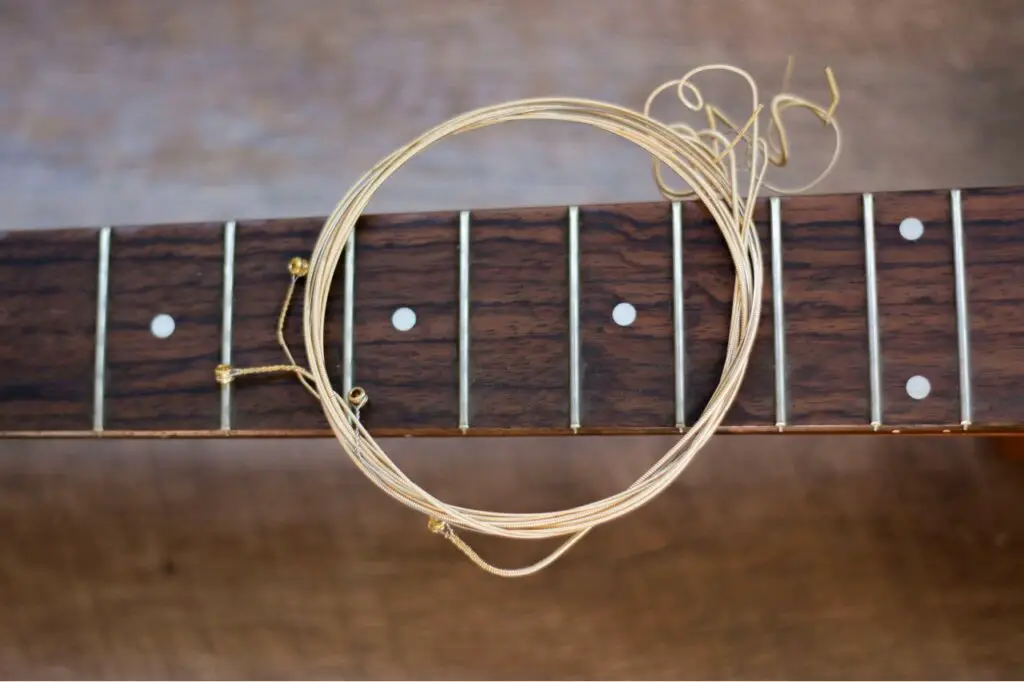One of the common challenges that guitarists face is broken strings. If you are in such a predicament, you must fix the problem to continue playing.
Since you must replace the guitar strings, you must find a place to buy the replacement. Does Walmart sell guitar strings?
That’s a question most people ask as they try to figure out their options. Honestly, there are various places where one can buy the strings.
The list of choices is long, from online websites to retail shops to guitar stores. As a matter of fact, Walmart is one of your options since it sells guitar strings too.
However, it turns out that you need to know more than a place to buy to get a suitable replacement. What about a discussion about things to help you choose wisely? Read on!
Can I Buy a Single Guitar String?
You don’t expect all your guitar strings to break simultaneously like any other equipment. If that’s the case, do I have to buy a dozen if I only need one string?
Fortunately, buying a single string and replacing the broken one is possible. Various online stores and guitar shops offer this option.
However, buying a single string for several reasons is never advisable. First, finding a store willing to buy a single string isn’t easy.
On the other hand, the price of buying guitar strings in bulk is fairer than purchasing a single one. So, consider buying bundles of guitar strings to save you time and money.
Which Guitar Strings Break Often?
A guitar string can break despite the musical instrument being brand new. The ones that break often are the ones that come at relatively light gauges.
They include the B, E, and G strings. That’s why it is advisable to have spare guitar strings to ensure that a broken one won’t derail you from learning and enjoying the guitar.
What is the Cost of Guitar Strings?
Interestingly, there is no definite price for a guitar spring. The cost depends on various factors, including the brand, type of guitar, material, and the number of strings.
Here’s a summary of various guitar strings and their price range;
- $4 to $41 if you own an electric guitar
- $4 to $43 if you own an acoustic guitar. It includes strings made of steel and 12-string sets
- $6 to $43 if you own a classical, including the nylon ones
- $9 to $133 if you own a bass guitar. It includes strings made of steel, and the 5-string and 6-string sets
Most stores will offer their customers a discount upon buying several sets. Besides the material and the type of guitar, some manufacturers add extras, too, thus explaining the relatively high cost.
An excellent example is the strings that have a coating. Fortunately, such extras increase the strings’ longevity, thus ensuring that you don’t replace yours frequently.
Besides, the number of strings also determines the guitar strings’ cost. Whereas the higher the value
Lastly, the winding method also determines the cost of your strings. Your options are the round wound, flat wound, and half wound or ground wound.
Top Guitar Strings Brands
Don’t overlook the brand you choose when buying your guitar some strings. After all, some brands are better than others, thus explaining why some guitar strings are more durable than their similar counterparts.
Some of the renowned brands regarding guitar strings include the following;
- D’Addario
- DR
- Elixir
- Ernie Ball
- Fender
- GHS
- Martin
Other Things to Consider When Buying Your Guitar Strings
Besides cost and brand, pay attention to these features when buying guitar strings. Check them out;
Coating
Your skin, sweat, oil, and dirt can destroy metal, and guitar strings are no exception. Fortunately, a coating is enough to prevent such damage.
The Nanoweb coating is light and thus feels and sounds similar to uncoated guitar strings. On the other hand, POLYweb is heavy, but the feel is smooth, not forgetting how it improves longevity.
Gauge
Regarding gauges, various options fall under 4 major categories;
- Extra light
- Light
- Medium
- Heavy
Whereas they may fall under the light range, expect those designed for an acoustic guitar to have a bigger gauge than their electronic counterparts. Equally important, various manufacturers have different gauges for their light string categories.
Consider heavy gauges for jazz, unamplified acoustic playing, low-action guitars, strumming, slide playing, or drop tunings. On the other hand, light gauges are suitable for fingerpicking, small-body guitars, vintage guitars, beginners, and blues or soloing.
In most cases, manufacturers combine light and heavy gauges. They use the former for G, B, and E strings, while the latter applies to the E, A, and D strings.
Metals
There are three common choices for various occasions if you own an electric guitar. The most common one is nickel-plated steel.
Another option includes pure nickel, ideal for a classic and vintage sound. Lastly, consider stainless steel, the most corrosion-resistant type and hardly suffers from finger squeaks.
On rare occasions, manufacturers use other electric strings. Their metals include copper, chrome, cobalt, and titanium.
Similarly, the most common acoustic strings are also three. First, there is the 80/20 bronze comprising 80% copper and 20% zinc, the most popular combination.
The next one is the phosphor bronze, similar to the 80/20 bronze. However, it also has phosphor, thus preventing oxidation and boosting durability.
Lastly, there’s silk and steel, also known as compound strings. Its low string tension and flexibility make the guitar strings mellow and gentle.
As for the classical strings, there are 4 common choices. They include the 80/20 bronze or gold strings popular for their projection and brightness.
There are also silver strings made of silver-plated copper. It is known for its warm, rich tone, and that’s why it is quite popular.
Before 1940, all guitar strings were made of gut, commonly called catgut. As the name suggests, it comes from farm animals such as sheep’s intestines. Interestingly, the material doesn’t come from cats, despite the name.
Gut proved hard to mass produce which saw the transition to nylon. Besides availability, it also replaced gut due to its cheapness. Various types include clear, composite, black, and rectified nylon.
String Core
Expect two types of cores, hex, and round. A hex-core is stiff and bright, whereas the tone is modern and consistent. Equally important, it has less sustain and a strong attack.
On the other hand, its round counterpart is flexible and warm. The tone is vintage and inconsistent, whereas its gentle attack offers more sustain.
Winding Method
When it comes to the winding, there are also 3 options. The first one is the round wound which uses a round wire.
There is also the flat wound that has a flat wire. Lastly, you will find a half-round that combines the two windings.
Round wounds are cheap and thus popular. The flat wounds are also popular but expensive, and half rounds lack many fans.





